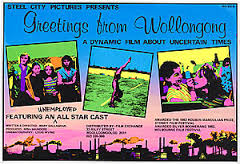
GREETINGS FROM WOLLONGONG
Australia, 1982, 45 minutes, Colour.
Kevin Bugden, Shirley Faulkener, Syd Long.
Directed by Mary Callaghan.
Greetings from Wollongong is an interesting short fiction film written by Mary Callaghan. It won a number of awards at Festivals and received some release in the United States.
It shows one day in the life of Wollongong. It focuses on three unemployed youngsters comparing them with the affluent healthy types in a Coca Cola ad). The film is documentary in its style yet narrative in its thrust. It invites an understanding of contemporary Australian society, problems of youth and unemployment via story. The city of Wollongong itself and its environment becomes a character in the film. The sights and sounds of Wollongong are to the fore.
The film has a point of view - but invites the audience to share the point of view via understanding of the characters. While the film was made in the 1980s, it is still quite relevant years later.
1. Impact of the film? interest? Enjoyment? Message? its awards? international and national release?
2. The impact of the film as short fiction and documentary? Content, style?
3. Government assistance for production, local assistance? A Wollongong, film? Spirit, hopes? The facts of life in Wollongong? The city, its look, industry, homes, factories, shops. environment? The attention to detail, sights and sounds?
4. Wollongong as a typical Australian city of the '8Os: family, youth, employment, industry? Quality and standards of life?
5. The visual flair of the film: editing and pace, animation, realism, naturalism? The range of music?
6. The title - the film as a visual postcard to Australia from Wollongong? The-Coca? Cola ad: The real thing, Coke, Coke ads Life? The three typical teenagers of advertising on the hoarding? The superimposition of Debbie, Steve and Gina?
7. The structure of the film: one day in the life of Wollongong, three youngsters and their day in Wollongong - and the next day the same again?
8. The milieu: a large city, steel industry, smog, the
radio and television sounds (and the range of programmes from General Hospital, the Flintstones to Sale of Century)? offices, shops, game parlours, the cinema, cafes? The city and its environment as character?
9. One day's portrait of Debbie: getting up in the morning, not bothering to get dressed, wasting time, minding her sister's baby, hanging out the washing, catching the TV (and letting the TV baby-sit the baby)? Mocking her mother as she got up? Her father going to the pub? Offhand relationship with Steve? The visit to the supermarket, cigarettes and the pink dye? Dyeing her hair watching the Flintstones? with the baby and asking it to go to sleep? Friendship with Gina? The scrapbook and its items? Going out, promising not to hitch-hike, getting out of the van? The shops, being moved on from the furniture shop, trying on the clothes, cheeky to the cashier, the store detectives and the discussion with the manager? The meeting with Steve and his friend? Trying to get into the film? Drinks - 'your attitude leaves a lot to be desired;? Drunk at the end of the day, walking home? The next day ... ?
10. A day's portrait of Steve: his not being picked for work, being told to clear off? Home, the discussion about his car registration, going to the employment office, the possibility of jobs, not wanting to work in the mills? Driving around, with his friend, talk, video games? The furniture shop, being moved on? With the girls, drinking, the car running out of petrol? Next day ... ?
11. A day's portrait of Gina: her work in the supermarket, the labels, the harassment from the manager, his sacking her? Going to the employment office, helping the Italian lady with her language? The apprenticeship, going to the factory, the sewing, seeing her friend? Possibilities? The boyfriend and chips for lunch looking at the view? To Debbie's place, the scrapbook, Debbie's hair, going out, hitchhiking, sharing the same experiences as Debbie? The encounter with her mother and the exchange in Italian? Next day ... ?
12. The sketch of the parents: the shift work, the stoic attitudes towards jobs, father coming home, the paper, pub, jinx down, hosing the garden? Knowing what his children are doing or not? Mother, breakfast, the sewing factory, the hard work, the ticket for the lottery? The other daughter and her baby?
13. The employment situation: those unemployed being told to clear off? The offices and the interviews, the Italian lady wanting a job? The news information about women at the factory getting the sack, the discussion with the manager? The furniture shop, the store detectives, the manager and his ticking off the girls? Possibilities, exercise of power?
14. A portrait of youth, the facts, prospects? Motivation?
15. Employment, possibilities in the city? limitations? The effect on youth?
16. The background comment from the media: Lachlan Chapman and his denunciation of poor teachers? Malcolm Fraser and the comment on parliamentary salaries? Chat programmes on the radio, talkback? Television programmes?
17. A sketch of Australia in the 1980s?